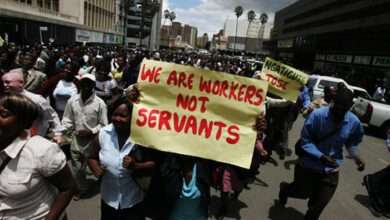Medical Aid Fees Price Hike Challenged

The Association of Healthcare Funders of Zimbabwe (AHFoZ) issued new pricing guidelines in November last year to cushion members against huge co-payments and shortfalls. The adjusted rates have prompted members to either downgrade packages or drop health insurance completely.
As private hospitals, doctors and laboratories continue pushing up their fees faster than inflation, medical aid societies are following suit forcing many out of private health care and private health insurance as they can no longer afford the fees and subscriptions.
AHFoZ chief executive officer Ms Shylet Sanyanga said it was too early to analyse the impact of the “inflation-adjusted tariffs” on shortfalls, co-payments or even downgrading. She said AHFoZ would be able to provide a clear picture on what is happening on the ground by the end of the first quarter.
“Statistics on the impact of the November fee review are not yet available. The festive period is usually slow in that fewer people seek healthcare services unless it is an emergency. The same applies to decisions pertaining to downgrading and related decisions. A more realistic picture of the impact on the ground will be established by end of the first quarter 2020,” said Ms Sanyanga.
The plight of medical aid beneficiaries has been worsened by the fact salaries and incomes have not been rising in line with the increases in costs. Medical aid societies are now charging about $600 for an average plan covering only the member plus a similar amount for the first adult dependent and an average of $350 every month for each dependent child.
This means a monthly subscription for an average plan covering member, spouse and two children is attracting about $1 900 every month, an amount that is far beyond the reach of an average Zimbabwean informal employment.
This has forced many to either downgrade to basic packages, which pay bills at public clinics and hospitals or drop health insurance completely. The increases were necessitated by the cost of healthcare which continues to increase with general practitioners now demanding at least $300 in consultation fees and specialists between $1 100 and $1 800 per visit.
Private hospitals now demand deposits of up to $10 000 for a patient seeking admission and for subsequent procedures. Government hospitals have also increased consultation fees in all its facilities, with patients seeking treatment from central hospitals now expected to pay at least $160 for adults, although this is very low compared to private healthcare.
Laboratory procedures, medicines and all other associated medical services have gone up with most providers using the US dollar black-market rates to peg costs of their services. An average health insurance package provides members and their beneficiaries’ access to private healthcare (general practitioners and specialists), investigations and some procedures.
The ceiling of one’s financial benefit on an average plan is also limited and does not usually cover major procedures that might be required out of the country.
A basic medical aid package provides members and their beneficiaries access to public health facilities and services. Some medical aid societies have intensified engagements with “receptive” service providers to do away with co-payments and shortfalls.
Health economist Dr Prosper Chatambara said while medical aid has a critical role to play, incomes cannot match the rate of inflation, rendering the concept useless. He said even if members resort to saving their money, it remains useless because of inflation.
“If people save on their own, they need to save in a strong currency otherwise the savings are eroded by inflation.
“We all need medical aid because it protects members financially if they suddenly have to pay unexpected medical costs but its more relevant in a normal economy, where there is stability,” said Dr Chatambara.
Another health economist Dr Shepherd Shamu said the current situation calls for employers to totally subsidise their employees’ medical aid cover. Dr Shamu said without that, most people will deem health insurance an expense and opt-out.
“For now, employers who care for their employees’ well-being should consider meeting full costs of the medical cover until a time when the economy normalises,” said Dr Shamu.
He said for a long-term solution, the Government should consider an all stakeholders meeting aimed at finding lasting solutions to these and other challenges bedevilling the health sector.
“People really need to meet and come up with an agreed way forward because at the moment everyone is pulling in their own way to satisfy the interests,” said Dr Shamu.
Dr Shamu said people without health insurance often find it difficult to pay huge unexpected medical bills, which in turn impacts on the quality of healthcare rendered to them in times of emergencies.
Source – The Herald

























